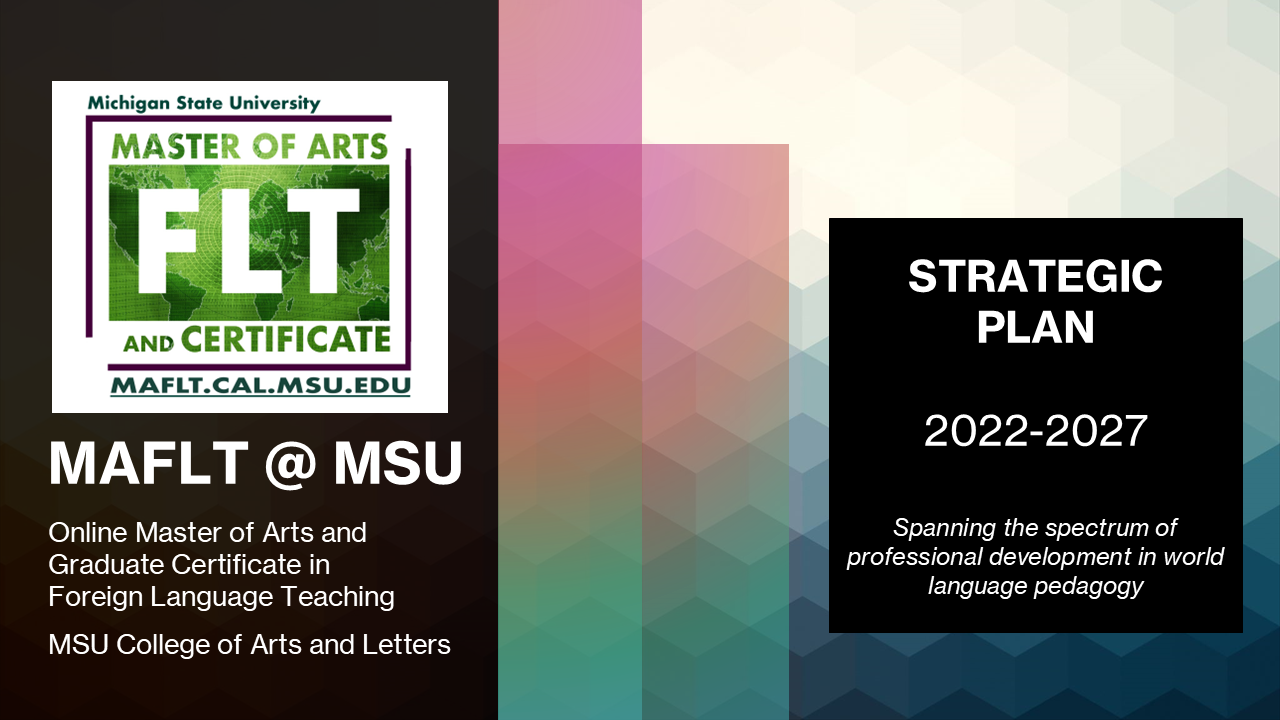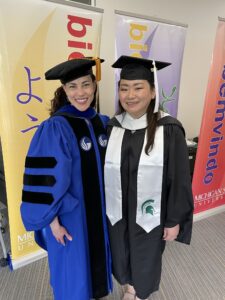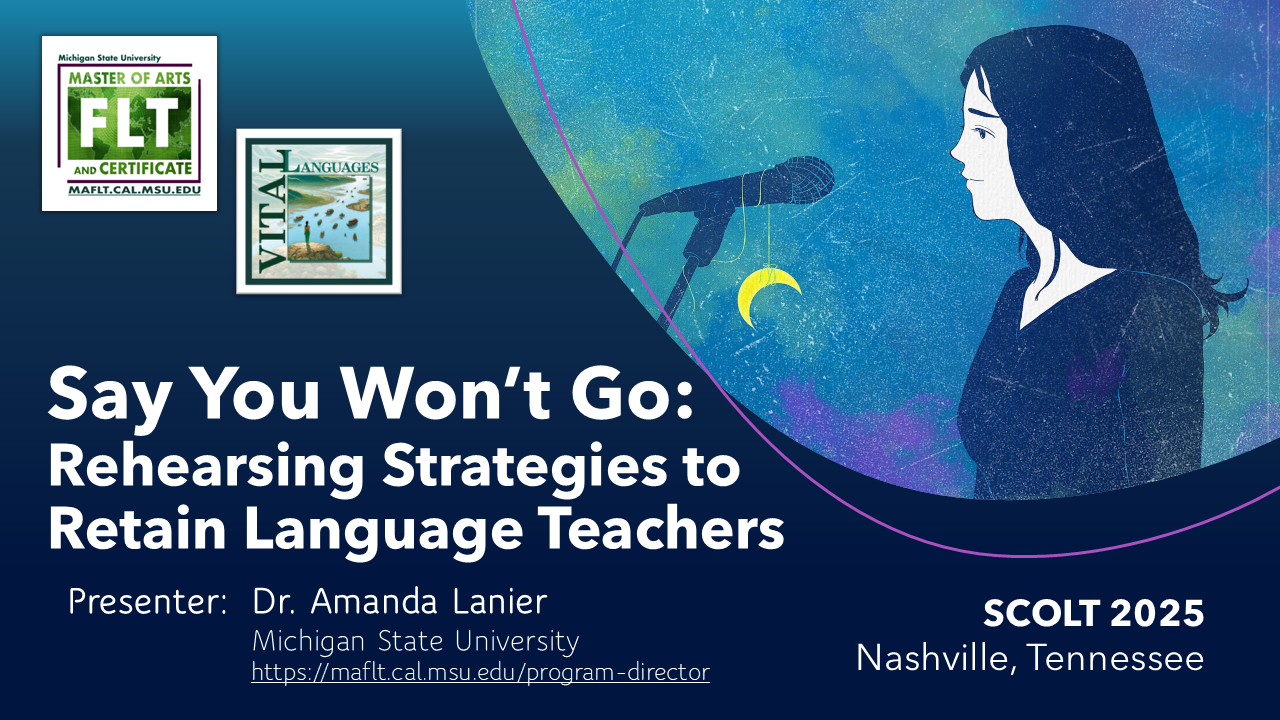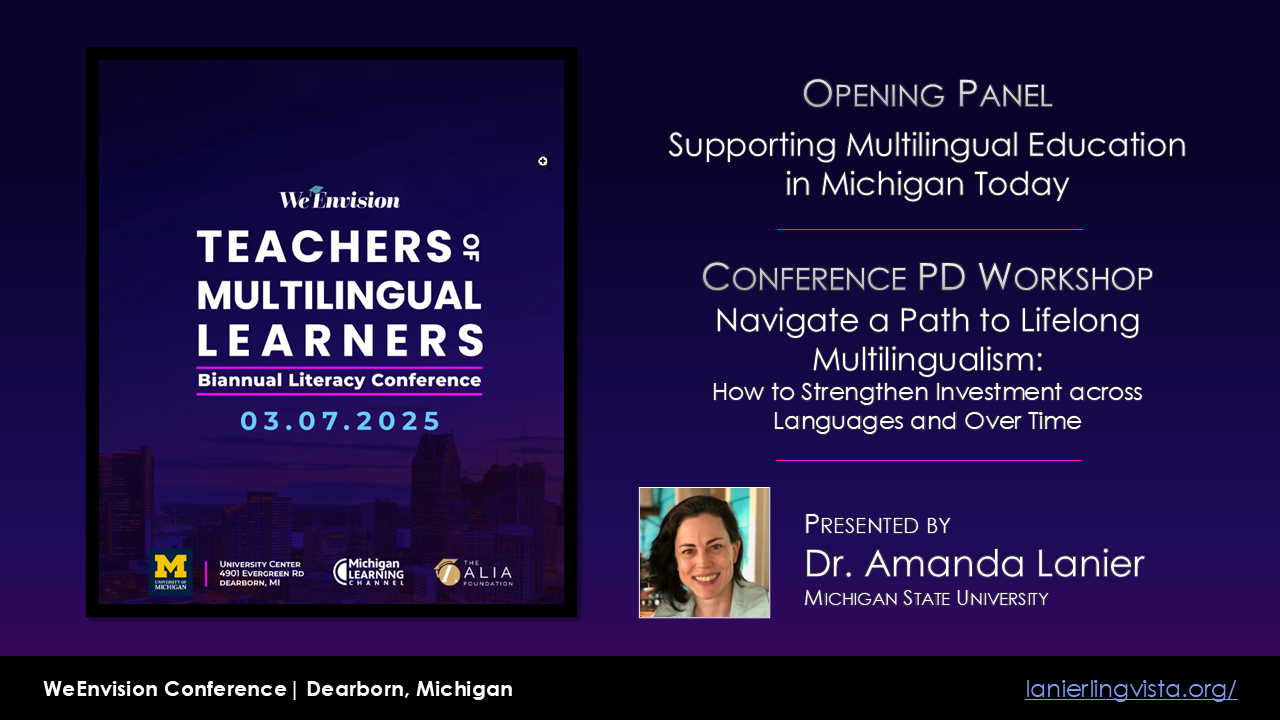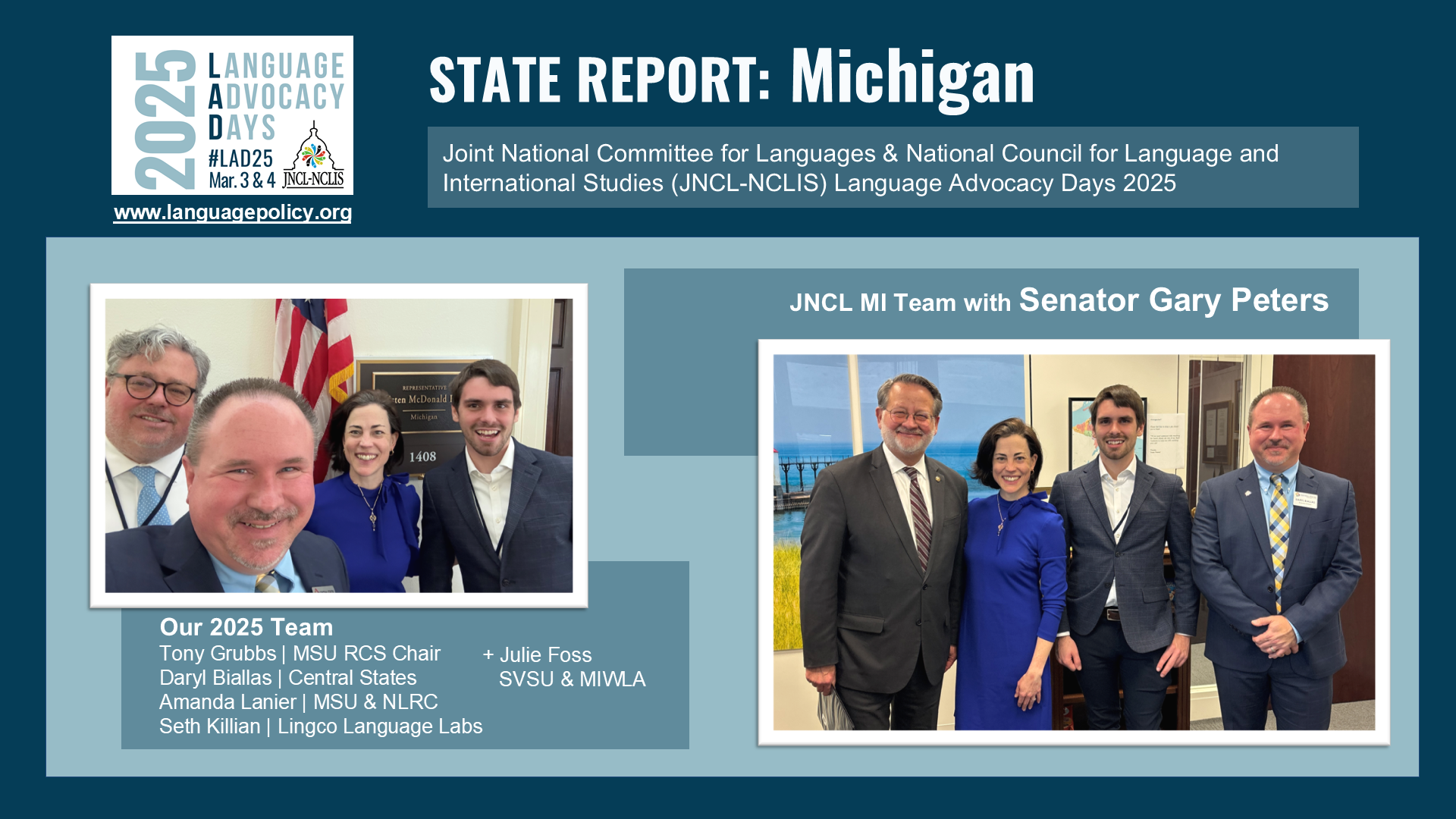As of spring 2023, over 100 alumni have graduated from the Master of Arts Program and one student has completed the Graduate Certificate in Foreign Language Teaching. Most of these students continue to hold jobs and positions of leadership as language teachers across the U.S. and in several other countries. The fact that they are continuing to work in this profession alone is remarkable and offers a testament to the effectiveness of our courses and programs. Reports from the Commission on Language Learning, the American Council on the Teaching of Foreign Languages, and the National Education Association, among others, demonstrate high demand for multilingual capacity in the U.S. workforce coupled with a nation-wide shortage of world language teachers and also a level of teacher burnout and attrition that is reaching desperate levels. It is no wonder that we are seeing declining application and enrollment rates in these graduate programs at a time when surveys of educator perspectives have shown that only 10% of teachers would strongly recommend their career to a young person and 30% see themselves leaving the field within five years. For my part, 2022 began with a month of illness with COVID-19 and walking pneumonia, and it is never simple to balance the demands of work and family, but I have relied on my personal networks, healthcare providers, strategies, and colleagues in and beyond MSU to maintain my own stability so that I could continue to lead the MAFLT.
Administration makes up a third of my contract and requires more than a third of my investment throughout the calendar year. In conjunction with our primary roles as instructors, the MAFLT faculty and staff have made significant strides in our efforts to enact strategic goals that we established together in 2021:
- Invest in Student Diversity and Community,
- Invest in Faculty as Intellectual Leaders,
- Invest in the Quality and Sustainability of the Program, and
- Invest in Impact and Advocacy in the Field of Language Learning and Teaching.
These areas of focus align with the Strategic Plan for MSU and address the vision for this program that I have established and cultivated in our faculty and students, that this program should offer an educational experience at a very high standard, for online or any other modality of instruction, while also contributing to our field through supporting and strengthening our faculty and our teacher-learners. In the wake of events this spring, my resolve to bolster the members of our MAFLT Network as individuals and as a community so that they are more capable and resilient in the face of ordinary and extraordinary challenges has only increased. The highlights of 2022 range from continuing to deliver quality online instruction while supervising two core faculty and my 50 graduate student advisees to beginning work with the newly-funded National LCTL Resource Center, but they also include returning to in-person conferences after the long pandemic hiatus and offering funding opportunities for students at the program level for the first time in the MAFLT’s history.

Invest in Diversity and Community
To invest in diversity and community, the most influential elements have involved the implementation of financial aid and paid internship opportunities for MAFLT students; continuing to use multiple platforms to deliver instruction and promote interaction with and among students; presenting with students at major conferences; collaborating with faculty in other units; and balancing the work we do to build rapport and offer interaction in our online courses by engaging with prospective students, current students, and alumni in virtual and face-to-face events.
I proposed our Linguistic Diversity Fellowships geared primarily toward teachers of LCTLs and teachers from under-represented groups, and we began awarding up to five fellowships each semester. I have recruited and marketed the program more broadly, using more effective tools and strategies, in consultation with MarCom and the Slate implementation team. We enhanced our student support resources, including a complete overhaul of the Orientation process (discussed further under Program Quality) and significant updates to the Final Portfolio course and procedures. We also continued to use multiple platforms to provide resources to FLT students and communicate with our MAFLT Network and other audiences, including D2L, Teams, email, GatherTown, Facebook and LinkedIn groups, Twitter, and the public MAFLT website.
We have also hosted a number of virtual and live events, including gatherings to celebrate the 12 students who traveled to East Lansing for MSU Commencement in 2022; our annual reunion during the ACTFL 2022 Convention; and regular MAFLT Meetup virtual events for students, alumni, colleagues from other departments, Fulbright Teaching Assistants, and visitors from beyond MSU including the ACTFL Teacher of the Year for 2022. As conferences begain to meet in person again in 2022, I also attended several conferences, usually as a presenter and/or exhibitor, where I interacted with students and alumni and cultivated opportunities for our faculty and students. These are listed on my Fact Sheet.
Invest in Faculty as Intellectual Leaders
To invest in faculty as intellectual leaders, I have first and foremost provided our core faculty with transparent and predictable expectations and goals as well as guidance in their primary task of teaching three courses per semester through leading weekly faculty meetings, expanding and sharing our already-extensive MAFLT Faculty resources via Spartan365 apps and D2L, identifying common needs and approaches that could be addressed collectively to reduce workload for individuals, making sure that the core faculty were active participants in the scheduling and content of their courses, encouraging them to innovate judiciously and reflect on their work, and coordinating our efforts to address any advising and student support issues that arose. These procedures were made more challenging by the fact that Bruna and then Fred were working remotely for most of 2022, but we have established practices in our communication and division of tasks using Teams and Asana that help to keep us connected and aligned. I also recruited and onboarded Luca Giupponi and Rajiv Ranjan as adjunct instructors in Summer 2022 and worked with Rajiv to create resources for teaching methodology to LCTL instructors.
Forseeing the need for a wider pool of instructors who would be prepared to engage with the MAFLT students well and teach courses at the level of rigor and quality we offer, I created the role of Faculty Affiliate Mentors for the MAFLT Program. This process involved obtaining approval from the chair of LiLaC, creating an application and selection procedure for several professors from LiLAC and the College of Education who specialize in language teaching and second language acquisition, and incorporating the selected FAMs into our Network. This role also serves to provide intellectual, professional, and personal community for our core faculty and these professors, all fixed-term faculty who primarily operate outside their disciplinary communities.
Throughout 2022, Fred Poole and Bruna Sommer Farias have also been able to give presentations, publish, attend annual meetings of ACTFL and other organizations, and coordinate on research and writing with colleagues beyond MSU. I have been advocating since before they were hired for a shift in their teaching load to allow greater capacity for research and outreach. Our team’s extensive collaboration on the Video-Based Virtual Inquiry for Development of LCTL Instructors (ViVID) Project through the NLRC has allowed for that reduction in teaching load for each of them and opened new pathways in regard to sharing knowledge, expanding opportunity, and mentoring as well as creativity and equity for LCTL instructors.
Invest in Quality and Sustainability of the Program
To invest in the quality and sustainability of the program, I have improved my management of procedures including recruitment, admissions, onboarding, advising, course design and revision, student support, tracking of enrollments and revenue, budget management, supervision of our GA and student interns, coordination with a number of other campus units, working with instructional technology to manage the requisition process and troubleshooting, and deal with ongoing changes to MSU systems, including Slate for admissions and marketing, SIS for advising, D2L for instruction, EBS for financial transactions, and Spartan365 apps for communication and collaboration. Hiring MAFLT students on hourly pay as interns was a major innovation and allowed access to their insights and input as well as adding people who could work on extensive projects, including the overhaul of the Orientation process and creation of self-directed Orientation modules in D2L and the significant update of the Program Handbook that was completed in 2023.
I have completely redesigned the recruitment procedures that allow us to capture leads and share news and reminders with various audiences, using Campaign Monitor, Slate, our programs’ pages on the MSU Online platform, Microsoft Forms, and Excel spreadsheets. This redesign helped to increase the potential value of ads that we placed in the FLTMAG and Language Magazine and exhibiting at conferences and helped us communicate with students and colleagues about MAFLT and NLRC projects and events. I not only participated in various live and virtual events throughout 2022 but also made sure that MAFLT students attended these events, received updates about them, and presented with me and other faculty. These included the annual meetings of the national (ACTFL), regional (CSCTFL), and state (MIWLA) organizations for language teachers; the National Coalition for Community-Based Heritage Language Schools; the Shared LCTL Symposium (SLCTLS); the Midwest Association for Language Learning and Technology (MWALLT); virtual evenst for ACTFL and IALLT; and a week this summer engaging with the largest in-person gathering for teachers pursuing comprehension-based language teaching (FM-iFLT).
Managing program procedures and supervising our graduate assistant, our student interns, the core faculty, and adjunct faculty meant that my use of Asana for project management needed to improve. We developed procedures for creating tasks, organizing tasks, communicating about tasks, and ranking priorities that made the system more effective and facilitated project completion. I also shifted my interpretation of the role of the MAFLT Graduate Assistant. Our GA was presented to me in 2020 as a solution to the lack of program staff, so I established the role of Program Assistant for the GA. That role proved to be ineffective for multiple reasons, so I reinterpreted it this year as Monique Yoder finished her term and I was onboarding Mary Ellen Rutemeyer. The main issues are that the GA term is only nine months and these PhD students begin with almost no familiarity with the program, so it takes half of their tenure before they can interface confidently with prospective or current students or deal with complex program management tasks. The other is that GA role is meant to be a professional development experience for the PhD student, which does not typically include work they view as rote or secretarial, and yet the focus of their cognitive resources is, and should be, their PhD program’s tasks and requirements. As a result, I have worked with Mary Ellen primarily on projects with distinct boundaries, such as the MAFLT Showcase, and asked her to focus on support for faculty in the form of documenting meetings, managing tasks, and contributing to my collaborative research project on world language programs. As a consequence, however, all MAFLT Program communication continues to route to my inbox. I also interface with our Functional Team on all MAFLT Program tasks that involve our Academic Coordinator, Office Operations, Finance, or HR, and I maintain the content and function of our public WordPress site and social media accounts.
The other important contribution to program quality this year is the Program Evaluation in progress. I agreed to collaborate with Luca Giupponi so that he could fulfill the requirements of his doctoral program by conducting an evaluation of the MAFLT, and that process has required considerable involvement and access but in return will yield insights into student and alumni experiences and ways we can improve going forward.
Invest in Impact and Advocacy
To invest in impact and advocacy, the most salient step to those outside the MAFLT Network has probably been our contribution to the grant submission and a key project in the newly-funded National LCTL Resource Center, the ViVID Project (Video-Based Virtual Inquiry for Development of LCTL Instructors). Other important investments in impact have been major steps to make MAFLT student and alumni work available to audiences outside the program, so that other language teachers and programs can benefit from the supervised projects that they complete for their Experiential Modules (see the EM Showcase) and share on their Final Portfolios (see the Portfolio Gallery).
On MSU campus, I have contributed to language teacher education, faculty growth and community, and online program development. In addition to the Faculty Affiliate Mentors discussed above, I coordinated with Sandhya Shanker and the world language teacher trainees under her supervision in the College of Educaion by visiting their class and allowing them to participate in our internal virtual conference, the Foreign Language Excellence Exchange (FLEx) in December, which also required creating a public-facing site for the FLEx Conference on the MSU Commons platform. I presented a workshop for the Graduate School’s learning community for teaching assistants across colleges. I worked with Jen Marcy in Summer 2022 after she was hired as Director of the Global Non-Profit Leadership program, which will be the second online graduate program in the College of Arts and Letters, providing her with access to MAFLT materials and advice on infrastructure and procedures. I also partnered with SLS to help establish the hybrid MA TESOL through the Japan Centers for Michigan Universities. I continued to participate in Online Program Directors events and Teams interaction, became part of the Spartan365 Champions group, and continued to fulfill service expectations in the College Graduate Committee and CeLTA while also reaching out to the Asian Studies Center and the Center for European, Russian, and Eurasian Studies.
Beyond MSU campus, I gave presentations that addressed language program vitality and language teacher isolation and development for CSCTFL 2022, the Panhandle Language Teachers Association, and the Extempore Extravaganza 2022. I also led a meetup on advocacy at CSCTFL 2022. In Fall 2022, I worked with three students to present a session on the challenges and benefits of virtual community for MIWLA 2022, I created a LinkedIn group to support virtual community during the Community-Based Heritage Language Programs 2022 hybrid conference, and I maintained a LinkedIn group for the MAFLT Network and our colleagues as well as establishing ways for our new ViVID Fellows to interact with us and each other, which required multiple attempts and iterations.
The research projects that I am currently leading also contribute to impact and advocacy. The largest IRB-approved is the Program Diaries project, which is a multi-year collaboration with students in FLT 817 to examine and improve their own world language programs across the U.S. and as far away as South Korea. I also worked with two students to design and get IRB approval for a national survey on language teacher attrition and retention. The ViVID Project also includes an IRB-approved research project led by Bruna Sommer Farias, Fred Poole, and me, that will have multiple components over the four years of the current NLRC cycle.

